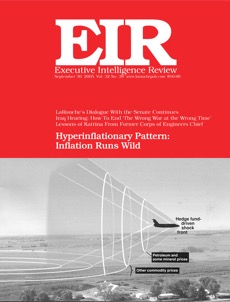Hyperinflationary Patterns: Inflation Runs Wild
by Lyndon H. LaRouche, Jr.
Lyndon LaRouche warns: “The world is presently gripped by a hyperinflationary wave-front of a Riemannian type. The situation is already comparable, at its primary-commodities ‘spear point,’ to Germany during the second half of 1923, with the other categories, such as consumer prices generally, on the way to being driven to overtake the effects seen currently in the domain of primary commodities being led, as a pack, by wild-eyed petroleum-price speculation.”
LaRouche Briefs Media: Government Can Control Today’s Hyperinflation
by Lyndon H. LaRouche, Jr.
From an interview with talk show host Jeff Rense of Genesis Communications Network, on Sept. 21.
Shocks in Unsound Economies
by Lyndon H. LaRouche, Jr.
A memorandum by LaRouche to his associates.
LaRouche PAC Testimony: Put a Lid on Prices, Re-Regulate Energy
Testimony submitted to the Sept. 21 hearing on energy pricing of the U.S. Senate Committee on Commerce, Science and Transportation.
LaRouche Webcast
LaRouche’s Dialogue with the Senate Continues
by Lyndon H. LaRouche, Jr.
Questions and answers from Lyndon LaRouche’s Sept. 16 webcast in Washington, D.C., starting with the issue of oil prices and speculation.
Economics
In a New TVA, Housing May Be the Biggest ‘Infrastructure’ Project
by Paul Gallagher
Unless adequate investment is made, on the vast scale of FDR’s Tennessee Valley Authority project, the Gulf Coast region could become relatively depopulated in the wake of Hurricane Katrina, its poorer evacuees driven to relocate elsewhere and stranded for years in “temporary housing.”
Gulf Coast Ports and Rail Must Be Rebuilt
by Mary Jane Freeman
‘Category 5 Levees Should Have Been Built’
by Mary Jane Freeman
Interview with Gary P. LaGrange.
‘We’ve Had 40 Years of Total Disregard For the Future—And We’re Paying for It’
by Richard Freeman
Interview with Michael Parker.
How the Netherlands Prepared for a 10,000-Year Disastrous Flood
by Richard Freeman and Nina Ogden
Interview with Alwin Nijhuis.
National
Congress Must Tackle Hyperinflationary Blowout
by Jeffrey Steinberg
Sometime very soon, Congress is going to be called upon to deal with the worst global financial and monetary shock collapse in modern times. Under the best of circumstances, such action will occur after the removal of Vice President Dick Cheney and President George W. Bush from office. If the financial meltdown occurs prior to that, the burden on the members of the Senate and House will be all that much greater.
Why LaRouche Opposes the Roberts Nomination
How To End ‘The Wrong War at the Wrong Time’
by Michele Steinberg
A report on an informal Congressional hearing called on Sept. 15 by Rep. Lynn Woolsey (D-Calif.), on defining an exit strategy from Iraq; and on the 14th annual conference of the National Council on U.S.-Arab Relations, entitled “Restoring Arab-U.S. Trust in a Time of Turbulence and Reforms.”
Documentation: Rep. Charles Rangel (D-N.Y.) and former Sen. Max Cleland (D-Ga.) speak at the Sept. 15 hearing; and remarks by Hon. Charles Freeman, the former U.S. Ambassador to Saudi Arabia, to the conference of the National Council on U.S.-Arab Relations.
International
German Election: Upset for Neo-Con Merkel; Increase for LaRouche Vote
by Rainer Apel
Although incumbent Chancellor Gerhard Schröder did much better than expected against opponent Angela Merkel, he still does not have enough votes to form a coalition government. That makes the Oct. 2 delayed election in one city district, Dresden-I, critically important—and the LaRouche forces are mobilizing there.
We Must Have an All-Out Dresden Election Effort
by Helga Zepp-LaRouche
A statement by the Chancellor candidate of the Civil Rights Movement Solidarity (BüSo).
When Might Makes Right: A New Legal Philosophy
by Elke Fimmen
A profile of former German President Roman Herzog.
North Korea: Joint Statement From Six-Way Nuclear Talks
Law vs. Brute Force: The Fight over Iran’s Nuclear Program
by Muriel Mirak-Weissbach
Interviews
Gary P. LaGrange
A New Orleans native, LaGrange has been Executive Director and CEO of the Port of New Orleans since 2001. He was Executive Director of the Mississippi State Port Authority at Gulfport from 1999-2001, and of the Port of South Louisiana in 1997.
Michael Parker
A five-term U.S. Representative from Mississippi, 1989-99, Parker served as Assistant Secretary of the Army for Civil Works (chief of the U.S. Army Corps of Engineers) from October 2001 until March 2002, when he was forced to resign for his public criticism of significant cuts to the Corps budget for economic infrastructure.
Alwin Nijhuis
A senior advisor for the Netherlands Ministry of Transport, Public Works, and Water Management, Nijhuis spoke to EIR about the experience of a nation, many of whose cities are below sea-level, but which has the infrastructure in place to cope with the killer storms of the North Sea.
Editorial
The Insanity Factor



